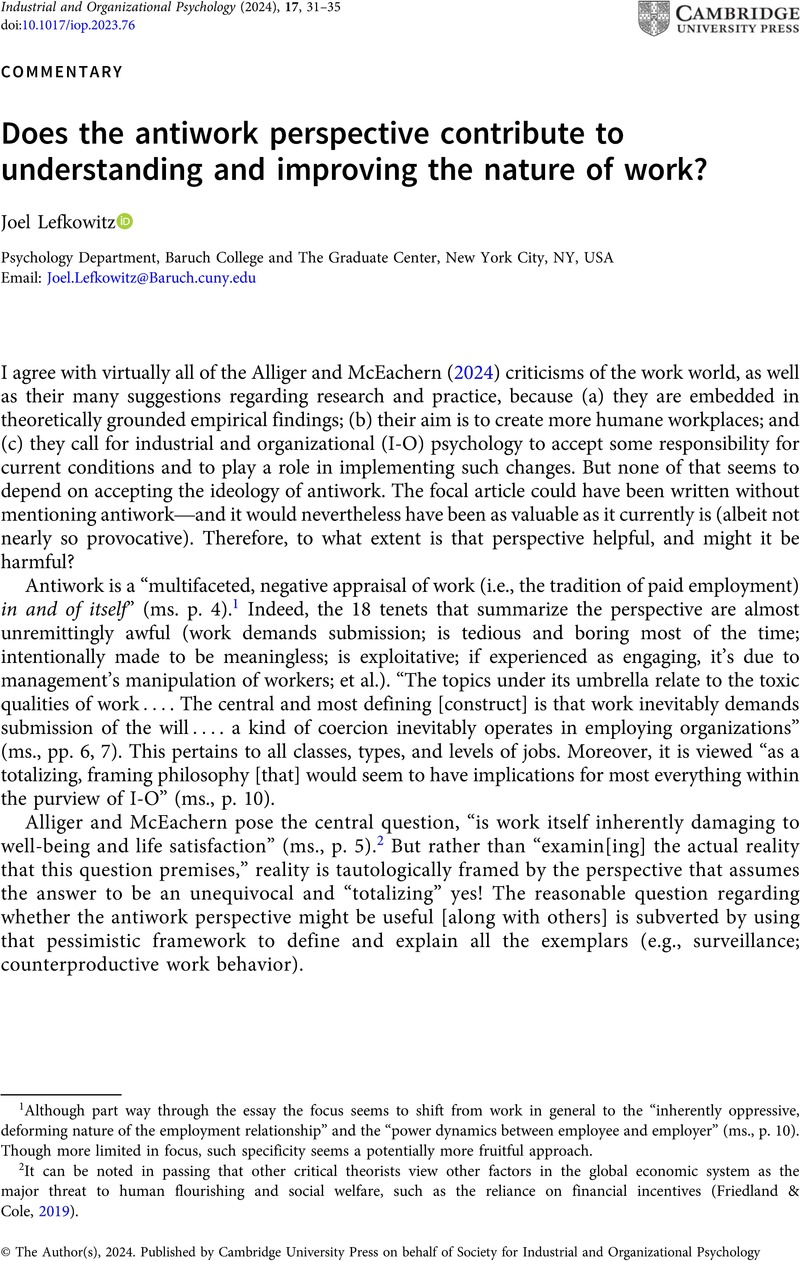No CrossRef data available.
Article contents
Does the antiwork perspective contribute to understanding and improving the nature of work?
Published online by Cambridge University Press: 07 March 2024
Abstract
An abstract is not available for this content so a preview has been provided. Please use the Get access link above for information on how to access this content.

- Type
- Commentaries
- Information
- Copyright
- © The Author(s), 2024. Published by Cambridge University Press on behalf of Society for Industrial and Organizational Psychology
References
Alliger, G. M. (2022). Anti-work: Psychological investigations into its truths, problems, and solutions. Routledge.Google Scholar
Alliger, G. M., & McEachern, P. J. (2024). Antiwork offers many opportunities for I-O psychologists. Industrial and Organizational Psychology, 17(1), 1–30.CrossRefGoogle Scholar
American Psychological Association (2023). 2023 work in America survey. https://www.apa.org/pubs/reports/work-in-America/2023-workplace-health-well-being.Google Scholar
Frederick, W. C. (1995). Values, nature, and culture in the American corporation. Oxford University Press.Google Scholar
Friedland, J., & Cole, B. M. (2019). From homo-economicus to homo-virtus: A system-theoretic model for raising moral self-awareness. Journal of Business Ethics, 155(1), 191–205.Google Scholar
Lefkowitz, J. (1990). The scientist-practitioner model is not enough. The Industrial-Organizational Psychologist, 28
(1), 47–52.Google Scholar
Lefkowitz, J. (2008). To prosper, organizational psychology should…expand its values to match the quality of its ethics. Journal of Organizational Behavior, 29, 439–453.Google Scholar
Lefkowitz, J. (2009). Promoting employee justice: It’s even worse than that!. Industrial and Organizational Psychology, 2, 220–224.Google Scholar
Lefkowitz, J. (2011). The science, practice, and morality of work psychology. Industrial and Organizational Psychology, 4(1), 112–115.CrossRefGoogle Scholar
Lefkowitz, J. (2012a). The impact of practice values on our science. The Industrial-Organizational Psychologist, 50
(2), 16–22.Google Scholar
Lefkowitz, J. (2012b). The morality of business: From humanitarian to humanistic work psychology. In Carr, S. C., MacLachlan, M., & Furnham, A. (Eds.), Humanitarian work psychology: Alignment, harmonization and cultural competence (pp. 103–125). MacMillan.Google Scholar
Lefkowitz, J. (2013). Values of I-O psychology, another example: What and whom we don’t study and what it all suggests about the profession. The Industrial-Organizational Psychologist, 51(2), 46–56.Google Scholar
Lefkowitz, J. (2014). Educating I-O psychologists for science, practice, and social responsibility. Industrial and Organizational Psychology, 7(1), 41–46.Google Scholar
Lefkowitz, J. (2019). The conundrum of industrial-organizational psychology. Industrial and Organizational Psychology, 12(4), 473–478.Google Scholar
Lefkowitz, J. (2021). Forms of ethical dilemmas in industrial-organizational psychology. Industrial and Organizational Psychology, 14(3), 297–319.Google Scholar
Lefkowitz, J. (2023a). Values and ethics of industrial-organizational psychology (3rd edn.) Taylor & Francis/Routledge.Google Scholar
Lefkowitz, J. (2023b). Humanitarianism and the UN sustainable development goals are insufficient: The case for humanistic industrial-organizational psychology. Industrial and Organizational Psychology (in press).Google Scholar
Lefkowitz, J., & Watts, L. L. (2022). Ethical incidents reported by industrial-organizational psychologists: A ten-year follow-up. Journal of Applied Psychology, 107(10), 1781–1803.Google Scholar
United States Public Health Service. The U.S. surgeon general’s framework for workplace mental health and well-being (2022). https://www.hhs.gov/surgeongeneral/priorities/workplace-well-being/index.html.Google Scholar




